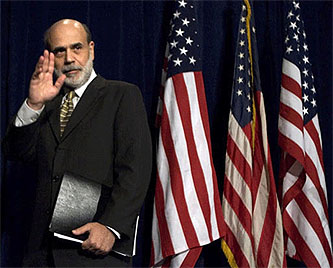Over at our main site, James Ridgeway remarks that “the Federal Reserve seems to be catching remarkably little blame for the current economic crisis.” This doesn’t surprise me. After all, in a lot of ways the Fed seems to be practically the only institution in Washington actually capable of taking dramatic action these days. And something is better than nothing.
 More interestingly, James points to a Nation piece by William Greider, a longtime Fed watcher, in which he climbs down slightly from some of his previous criticisms. It’s not that he suddenly thinks the Fed is doing a good job, but drawing on the work of progressive economist Jane D’Arista he suggests that part of the problem is that the Fed now has too little authority:
More interestingly, James points to a Nation piece by William Greider, a longtime Fed watcher, in which he climbs down slightly from some of his previous criticisms. It’s not that he suddenly thinks the Fed is doing a good job, but drawing on the work of progressive economist Jane D’Arista he suggests that part of the problem is that the Fed now has too little authority:
When deregulation began nearly thirty years ago, some leading Fed governors, including [Paul] Volcker, were aware that it would weaken the Fed’s hand, and they grumbled privately. The 1980 repeal of interest-rate limits meant the central bank would have to apply the brakes longer and harder to get any response from credit markets. “The only restraining influence you have left is interest rates,” one influential governor complained to me, “restraint that works ultimately by bankrupting the customer.”
….The central bank was undermined more gravely by further deregulation, which encouraged the migration of lending functions from traditional bank loans to market securities, like the bundled mortgage securities that are now rotten assets….In 1977 commercial banks held 56 percent of all financial assets. By 2007 the banking share had fallen to 24 percent.
The shrinkage meant the Fed was trying to control credit through a much smaller base of lending institutions. It failed utterly.
The problem, D’Arista argues, is that the Fed’s control of short-term interest rates has less and less effect on long-term interest rates as the money supply moves outside the traditional banking system. And fixed capital adequacy requirements, which require banks to slam the brakes on lending during bad times, make things even worse.
Read the whole thing. I don’t have the chops to fully evaluate what she says, but it’s an intriguing argument and I’d be interested in hearing reaction from other blogospheric economists. It’s something to think about once we’ve put out the immediate fire.

















